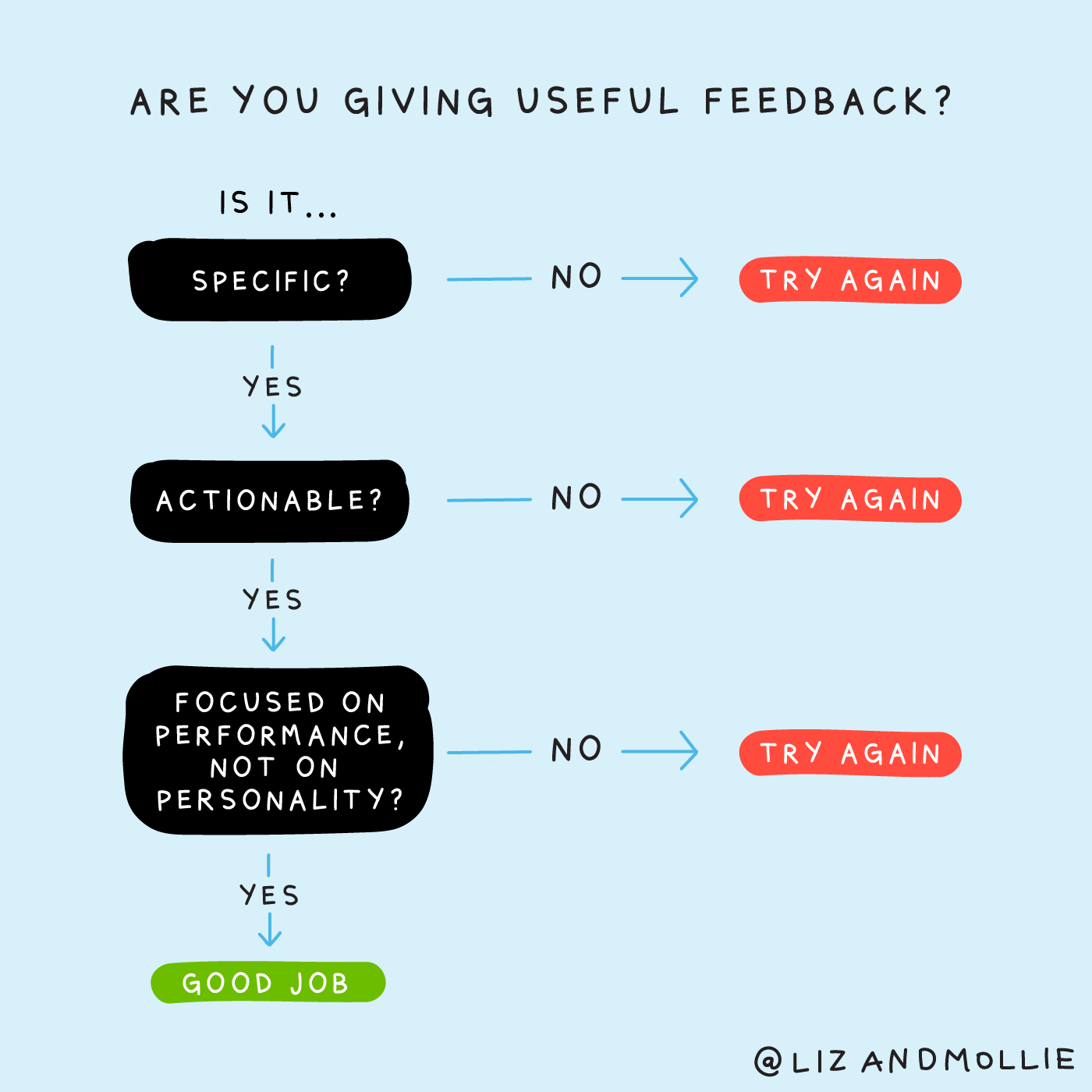The Tricky Beast of Feedback
Feedback is valuable and powerful for us to learn and grow... but it's also tricky to both give and receive!

I taught a workshop recently.
The morning of the session I spent more time getting ready than I did delivering it. It was only the second in-person session I had done since Covid and I had a low hum of mild anxiety as I went through the normal steps of my routine.
I had a new haircut I wasn’t entirely sure I liked yet but styled it as best I could. I did a little more makeup than my usual basic mascara and blush combo, carefully drawing a winged eyeliner with a subtle shimmery eyeshadow. I wore the outfit I had picked out the night before, being particular to choose one that was both relatively comfortable and warm enough for our tricky spring weather but still professional and stylish.
With my laptop bag pre-packed with the gambit of Kleenex and chapstick to HDMI cables and adapters and a to-go coffee ready at the door, I made my way to the session. I was in what my husband and I have often joked about as being my work costume and mask.
I was a bit nervous. In truth, I feel nervous before every speaking gig, despite having done dozens of them. I always practice and update my talks, trying my best to cater to each audience and ensure they get solid takeaways.
But there is always the worry that it won’t be what they wanted.
I made the drive downtown and meandered my way to the correct room, made small talk with the person hosting the session, and then got to it.
It was a quiet group, though they warmed up by the end and I got a few laughs and some good questions. I thought it went well overall, though it is often hard to tell.
As always, I left both exhausted after being “on” for so long and relieved that it was over. My inner introvert breathed a sigh of relief as I shut my car door in the parkade and made my way home to shed my “costume” and “mask”.
I was glad I had the foresight not to book any additional meetings and I took the afternoon off for the most part.
And by off I mean alternating between reading my book and refreshing the feedback form I sent after the session, waiting for results 😬.
Asking for feedback
After all of my workshops, I send out a 3-question form that asks:
1. On a scale of 1 to 10, how likely are you to recommend Ashley's session to a friend or colleague?
2. Which topics or aspects of the session did you find MOST interesting or useful?
3. Was there anything NOT covered that you had been hoping for or that you wished was covered in more detail?
I say that I am always looking to learn and grow. I like to believe that’s accurate, but the truth is a bit more complicated.

The tricky beast of feedback
I got negative feedback from two people out of about 25. Most people rated the talk highly, 8s, 9s, and 10s and found it useful. Many said very nice things, but these two gave me a 5.
5 out of 10! 😫
In all of my many sessions, I had never been given a 5 before and I couldn’t stop thinking about it. The feedback itself for one of them was useful, the other less so. One was bordering on rude, the other entirely reasonable.
But in a way, the feedback mattered less than how it made me feel.
It shook me a little. It felt like an affront to all the preparation and effort I put in to make the session valuable. It made me feel like I was in fact not a good speaker and not qualified to speak on any topics whatsoever.
The joke of the work costume and mask felt more apt than I realized. I felt like a complete fraud.
Turns out feedback is a tricky beast.
If you know anyone who might like Every Intention, please share it with them!
Taming the feedback beast and quieting the imposter
It’s been several weeks since that workshop. I feel better about myself and my inner imposter has quieted for now.
But it’s been bothering me that the critical words of a few people (amongst many positive words) could shake my confidence so easily.
I ostensibly know:
- I’m not for everyone and that’s ok.
- Not everyone is going to connect with what I have to say and teach.
- Critical feedback is good and required to continuously improve.
- I truly do want to learn and grow so I can do better at the next talk.
But do I know, know these things?
I think I do, but there still seems to be that imposter part of me that is eager to find new reasons to remind me that I am not smart enough, good enough, just not enough.
We all have one, that inner jerk that tells us stories about ourselves that make us feel bad. My inner jerk is friends with my inner perfectionist and they occasionally get loud, drowning out the things I KNOW, but don’t always feel.
This experience got me thinking about how tricky receiving both positive and negative feedback is.
Reflecting on negative feedback
On the negative side, nothing is (or will ever be) perfect and there is always room for improvement. In fact, negative feedback is often more valuable than positive because it encourages reflection and promotes change.
When you receive negative feedback, the things you need to remember (that I need to remember) are:
- You cannot improve if you don’t know what to improve.
- You don’t even have to agree with the feedback, only listen to it with openness.
- Sometimes the negative feedback has nothing to do with you and everything to do with the person giving it.
- Someone saying something negative doesn’t necessarily make it true.
- You will always receive negative feedback, eventually.
The challenge with negative feedback is that it requires you to examine the thing that was said and ask yourself if there is any part of it that does ring true. It requires you to reflect and perhaps poke old scars.
But if you can get past the initial sting and the strange cocktail of indignation and shame that comes with it, there is usually at least a kernel of opportunity. Sometimes there is even a revelation.
Reflecting on positive feedback
Positive feedback is just as tricky as negative feedback. It makes you feel good but can often lack value.
For example, when I receive answers to my 3 feedback questions above of 10/10, everything was great, nothing to add… there isn’t anything actionable.
There is even a question of whether the positive feedback is genuine or:
- A minimal effort to feel like they have fulfilled their duty to fill out the form but gave it no time or thought.
- Your inner imposter telling you that the positive feedback is people “just being nice”.
When you receive positive feedback, the things you need to remember (that I need to remember) are:
- You did do a good job. A few pieces of negative feedback don’t cancel out all the positive or make all the people who did enjoy your work liars.
- Take it at face value. Most people don’t fill feedback forms out at all, so any responses you do get are valuable.
- You can have both done a good job AND have areas for improvement. They are not mutually exclusive. This is also the most likely outcome!
Also, do your best to accept positive feedback with a thank you. Don’t demure, make a joke, or minimize… just say thank you!

The gift of thoughtful, specific feedback
There is something in the middle of harsh words and pretty lies where the true gift of feedback lives. It’s being thoughtful with the words you choose but not hiding in platitudes. It’s thinking about what’s useful but not cutting.
The most useful feedback, both positive and negative, is specific. It tells you exactly:
- What was most useful or valuable
- What clicked or stood out
- What was not explained well enough or in enough detail
- What was missing
When you are giving feedback, think about not just your experience, but the impact your words have on the person you are giving them to. Be open and honest, but also kind. Do your best to provide value. Feedback should be given with empathy and intention.
Give the kind of feedback you want to receive.
As with all my experiences, a little distance and reflection are always helpful in eking out the value. The value in this one was a reminder that I still have work to do on receiving negative and positive feedback with openness. It was also a reminder to make a more thoughtful effort to give the feedback that I want to receive.
I’m delivering a similar workshop in a few weeks and will take all the feedback from this past session, negative and positive, and apply it as best I can to improve for the next group.
I will put on my work costume and mask again and invite the same opportunity for feedback when it is over.
And hopefully, after that session, I will be a little better. And for each session after.
Are you good at giving and receiving feedback? What would you do differently?
Could you use a sounding board to reflect on some feedback you've received and what to do with it?
Share
Ashley Janssen

Productivity consultant, writer, speaker, serial entrepreneur, chaos calmer, introvert, cat-lady. Lover of books, fitness, old fashioned’s, basketball, and video games.
Follow me on
Twitter
or
LinkedIn.
Hire me for
1 on 1 productivity consulting
or
speaking.
Related articles

Discovering The Right Way to Live

How to Develop the Skill of Asking for Help


Comments ()